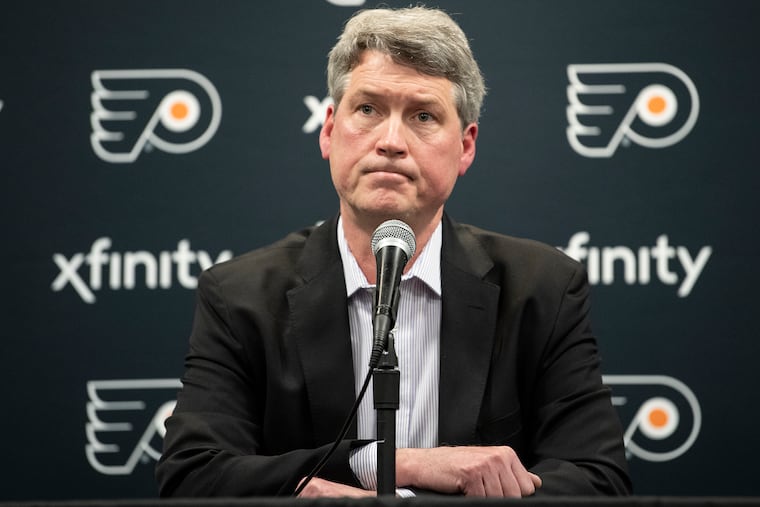Flyers GM Chuck Fletcher has his work cut out for him in improving this flawed team | Mike Sielski
Focus on this season, and it's a surprising disappointment. Zoom out, and you'll see it's part of a larger pattern.

Chuck Fletcher, the Flyers’ general manager, has been lonely lately. He calls one fellow GM after another, hoping one of them, just one, will be open to discussing a trade with him. Not only don’t these managers answer, but they don’t bother calling him back.
“It’s been really quiet,” he was saying Wednesday, during a video Q&A with media members. “There doesn’t seem to be a lot of teams out there willing to take on dollars or term at this point in time.”
So where does that silence leave the Flyers? They’re in the midst of a disappointing, downright infuriating season, losing nine of their 13 games this month, falling to fifth place in their division and out of playoff qualification, giving up goals like they’re trying to win a prize for giving up goals. In an earlier era, their go-to move in a situation such as this one would have been a trade that blew everyone’s hair back, something big that shook the entire franchise … or at least put the remaining players on notice. From some of the things that Fletcher said Wednesday, he might not mind pulling off such a deal now, if he could.
“I think the makeup of our group probably is not right,” he said. “I think that’s a fair comment. I think we do need to address that going forward to get the right mix. Certainly some of our young players need to continue to take steps. I think our back end, like the rest of our team, needs to get better. But overall, our team defense has been a collective effort, and we just haven’t been good enough in any aspect of the game yet.”
But that earlier era had Ed Snider and his win-it-all-now approach, and it didn’t have a salary cap. And that earlier era, in many ways, set the stage for the stagnancy in which the Flyers find themselves now. Zero in on this season, and yes, the Flyers obviously have regressed from the team they were over the final two months of the 2019-20 regular season, when they won 19 of 26 games and were playing a suffocating style of hockey before the pandemic struck.
Zoom out, though, and view this season -- even with its stops and starts and COVID-induced problems -- through the wider lens of the last nine years, and it falls right in line with a long pattern for this franchise: Make the playoffs. Miss the playoffs. Have a season that suggests better days are ahead. Have a season that suggests they aren’t.
» READ MORE: Flyers GM Chuck Fletcher is in buying mode and says the team’s poor season ‘starts with me’
Fletcher was hired only in December 2018, so he’s not responsible for creating this swamp that the Flyers have been stuck in for so long. But he was charged with accelerating the rebuild that his predecessor, Ron Hextall, initiated, and he has been weighed down by the same shackles that the Flyers attached to themselves years ago. Consider two.
1) I have noted this figure/fact in previous columns, and I’m going to keep noting it until more people begin to understand and appreciate its gravity and ramifications: From 2004 through 2012, the Flyers drafted just three players who made any significant contributions to them at all. Three. Claude Giroux, Shayne Gostisbehere, and Sean Couturier. (If you want to count James van Riemsdyk, I suppose you can, though he is better thought of as a major free-agent signing.)
Over that nine-year period, the Flyers, on average, drafted one impact player every three years. Realistically, it will take them more than a decade to recover from that prolonged and profound failure in talent evaluation and decision-making. Why? For any number of reasons. Players get off to promising starts, then backslide. Players get injured and never reach their full potential. Players who appear to be sure things turn out not to be. The Flyers already are dealing with these pitfalls: Carter Hart, Nolan Patrick, Oskar Lindblom, Phil Myers, Travis Sanheim, Travis Konecny, German Rubtsov, Morgan Frost. Without a deeper pool of prospects and talent, a team will be mediocre and stay mediocre, just as the Flyers generally have.
2) In July 2013, the Flyers signed Giroux to a contract that was eight years long, worth $66.2 million, and had a no-trade clause. In July 2015, they signed Jake Voracek to a contract that was also eight years and just a tad less expensive than Giroux’s: $66 million.
Giroux has been a terrific all-around forward, and Voracek can be and has been a creative and productive offensive player. But if a franchise is going to commit that much time, money, and salary-cap space to two players, if a franchise is going to designate those two players as essential and immovable, then those two players can’t be just terrific and productive. They have to be dominant. They have to be among the league’s very best and most important players, standard-bearers every night and every year whose mere presence elevates an entire club. Giroux and Voracek have not been that, and their onerous contracts have limited the Flyers’ roster flexibility. Right now, they hamper Fletcher’s ability to do what he acknowledged Wednesday he has to do: change the makeup of this team.